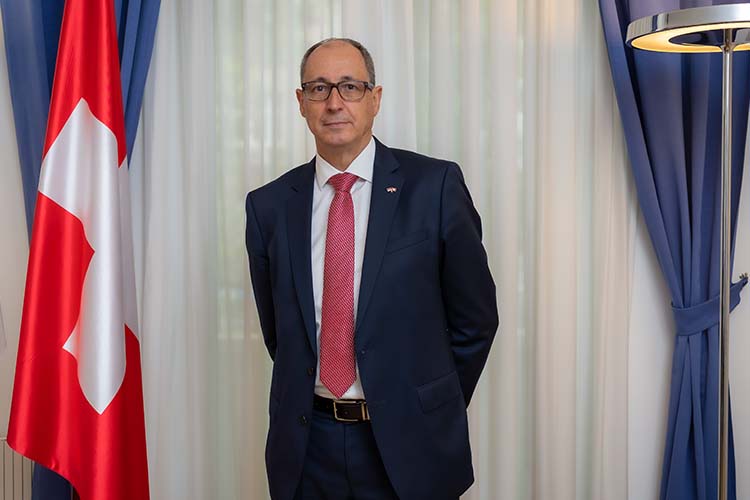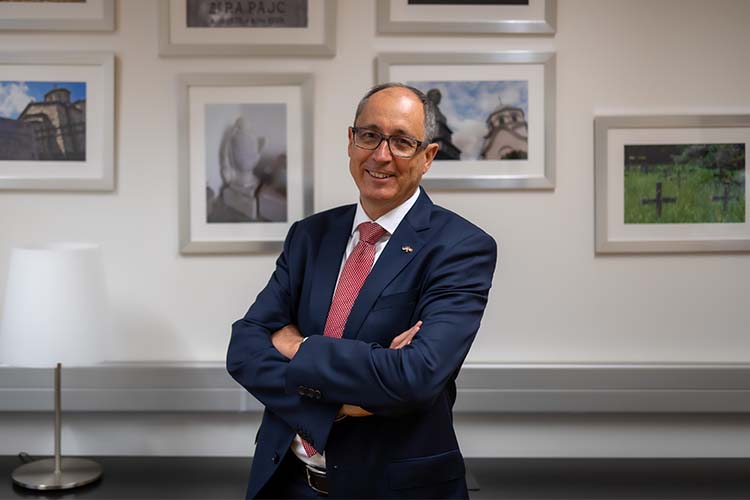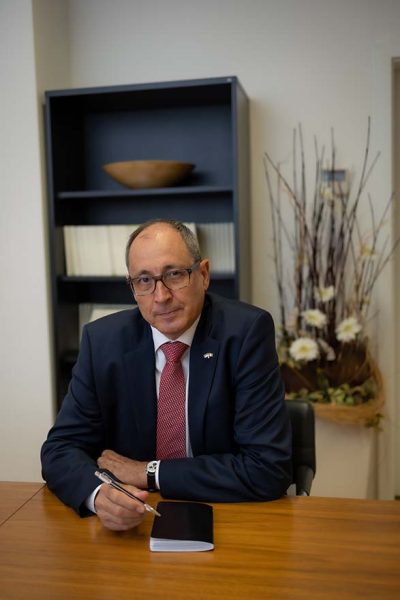The Swiss-Serbian Chamber of Commerce’s recent Business Climate Survey highlighted labour force quality and skill shortages as being among the top challenges for businesses operating in Serbia. An insufficient number of graduates and a dearth of experience have been identified as significant impediments ~ Urs Schmid
The economic partnership between Switzerland and Serbia is intensifying in various areas. Switzerland has become Serbia’s 4th largest partner in trade in services. Thanks to the ICT sector, Serbia records a surplus of 151.6 million euros in the trade in services. Rail sector giant Stadler is boosting its cooperation with Kragujevac, while company Etampa has launched the production of parts for the auto industry at its factory in Kruševac. “We remain committed to positively influencing Serbia’s governance, economic and environmental sectors,” says Ambassador Urs Schmid in this interview for CorD Magazine.
Your Excellency, given that half of your tenure in Serbia has already elapsed, what could you say about the current state of bilateral relations between Switzerland and Serbia?
I am pleased to note that relations between our two nations are experiencing a steady and encouraging progression. Our economic ties have grown substantially over the past few years. Since 2018, our bilateral trade has almost doubled and stood at 804 million CHF in 2022. This notable increase is indicative of the robustness and resilience of our economic partnership, even in the face of global challenges.
This shared commitment was demonstrated during the successful Joint Economic Commission that took place in June in Bern. The official talks were followed by a visit to a wastewater treatment plant, where the Serbian delegation, comprising representatives of different Ministries, was able to glean some useful information to take back for Serbia’s wastewater treatment projects.

Earlier this year, Swiss State Secretary of Foreign Affairs Livia Leu hosted her counterpart, State Secretary Goran Aleksić, for a round of regular political consultations. Security in the Western Balkans and the Belgrade-Pristina dialogue were important aspects of the discussion, as were our joint efforts in the areas of police cooperation and migration, as well as Serbia’s regional and EU integration processes.
Serving in this dynamic context is a pleasure, and I eagerly anticipate the continued enhancement of our bilateral relations during the remainder of my tenure.
How is implementation progressing when it comes to the Swiss programme of cooperation with Serbia for the 2022-2025 period, during which you’ve envisaged, among other things, support for local government and civil society in employment projects, economic development and adapting to climate change?
Approaching the midpoint of our current cooperation programme with Serbia, the Swiss Embassy team has made substantial strides, working side-by-side with our Serbian counterparts and aligning our efforts with Serbia’s strategic priorities. This includes bolstering local governance and renewing partnerships with government institutions, civil society organisations and the private sector.
Serbian IT companies are recognised in Switzerland and elsewhere for the quality services provided by highly skilled IT specialists and relatively low production costs
We have significantly boosted our engagement in economic growth, with notable initiatives like the “SME Hub” programme enhancing local enterprise development and job creation. In climate change efforts, we continue our longstanding support for energy transition, with a focus on efficiency and renewable sources, and we have become a key contributor to Serbia’s “Green Agenda” programme. We remain committed to positively influencing Serbia’s governance, economic and environmental sectors.
It was announced recently that Swiss company Stadler will engage in railway production in Kragujevac, which is a significant development in the process of revitalising Serbian railways. Could you speak about this collaboration?
We have indeed seen the development of successful collaboration between Swiss company Stadler Rail and Serbian Railways. The execution of the high-speed train project in just six months from its inception in April 2021 to the “roll-in” of the first train in October is testament to the diligent efforts of Serbian partners and the impeccable performance of Stadler Rail. The company is currently exploring potential partnerships with Mind Group in Kragujevac, focusing on railway component production and train manufacturing.

Serbia has recognised the strategic importance of rail transport and has been investing heavily in the revitalisation of its railway infrastructure. In this endeavour, Swiss companies are emerging as trusted partners.
Swiss company Etampa recently opened a factory in Kruševac to produce parts for the automotive industry, though it was announced at the same time that the factory is struggling to find adequate workers. To what extent is the Swiss business community in Serbia facing problems related to the lack of qualified workers?
The Swiss-Serbian Chamber of Commerce’s recent Business Climate Survey highlighted that labour force quality and skill shortages are among the top challenges for businesses operating in Serbia. An insufficient number of graduates and a dearth of experience have been identified as significant impediments.
Serbia’s economy has seen marked improvements, transforming the labour market and employment indicators. A thriving economy depends on a skilled workforce that’s capable of adapting to a technologically evolving market and driving productivity growth. Although Serbia boasts a robust education system, there is room for improvement in terms of matching education to the needs of the labour market. By adapting its current skill development policies and regulations, Serbia can cultivate a more productive workforce to meet the demands of businesses and foster economic growth.
The Dual Education concept, which has received strong Swiss support, was supposed to be one of the best ways to overcome this problem. Is this concept proving better at solving the problem of skilled labour in Serbia or enabling the even quicker departure of workers from the country?
Despite improvements in job creation and a decline in unemployment, Serbia’s youth unemployment remains high, at 26.5%, and labour force participation is low compared to the OECD average. Productivity is stagnating, both at the labour level and within SMEs, restricting wage growth and, consequently, the domestic labour market’s appeal to the Serbian youth.
Serving in this dynamic context is a pleasure, and I eagerly anticipate the continued enhancement of our bilateral relations during the remainder of my tenure
This situation emphasises the potential value of dual vocational education. By training a labour force to meet market needs, both labour productivity and company productivity can be boosted, leading to higher salaries and mitigating one of the main drivers of emigration. Therefore, Switzerland, in collaboration with the Serbian Government and the Chamber of Commerce and Industry, is investing heavily in dual vocational education, utilising specific Swiss expertise. However, the effects of these efforts will only be seen in the mid- to long-term, because a shift in approach needs to take place and this necessarily takes time.
You announced late last year that Serbia has been recognised as a net exporter of IT services to Switzerland, with the value of that exchange having even exceeded the value of the goods trade between the two countries. What makes these Serbian companies recognisable in Switzerland?

When it comes to trade in services, it is impressive to note that Switzerland has become Serbia’s 4th largest partner, with a total trade volume of 1.2 billion euros and a surplus of 151.6 million euros in Serbia’s favour. This is largely due to the Serbian ICT sector, as the country’s fastest-growing industry.
Serbia has successfully integrated into global ICT value chains and has benefited from the continuous boom in software outsourcing. Serbian IT companies are recognised in Switzerland and elsewhere for the quality services provided by highly skilled IT specialists and relatively low production costs.
Language skills are another remarkable advantage. It certainly pays off that foreign language learning is compulsory from the first year of primary school in Serbia.
A recent referendum in Switzerland led to the adopting of a law on climate change. When it comes to climate change, how much can such moves at the single country level contribute to shifting consciousness and policies at the global level?
On 18th June, 59.1% of Swiss voters accepted the Climate and Innovation Act, making it the first country to vote for net-zero greenhouse gas emissions by 2050. This law is not just about protecting the environment, as it also holds long-term economic benefits. The shift to renewables also spurs innovation and job creation.
As an Alpine country, Switzerland is particularly hard hit by climate change. Earlier climate protection efforts have already resulted in an 18% reduction in greenhouse gas emissions from 1990 levels by 2021.
Tackling climate change certainly requires global collaboration, as highlighted by the Paris Agreement, which Switzerland supports. But I am also convinced that early moves at the single country level will pay off in economic terms and provide good reasons to follow suit.
| COOPERATION Shared commitment was demonstrated during the successful Joint Economic Commission that took place in June in Bern | COMMITMENT We remain committed to positively influencing Serbia’s governance, economic and environmental sectors | REGULATIONS By adapting its current skill development policies and regulations, Serbia can cultivate a more productive workforce to meet the demands of businesses |
|---|